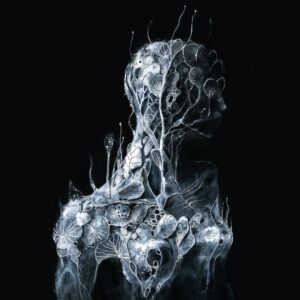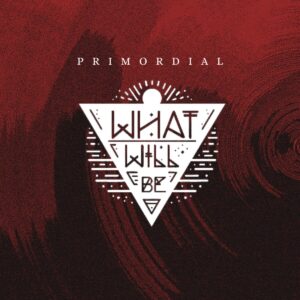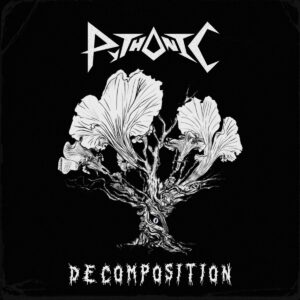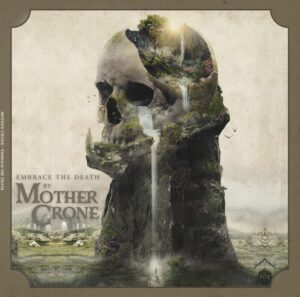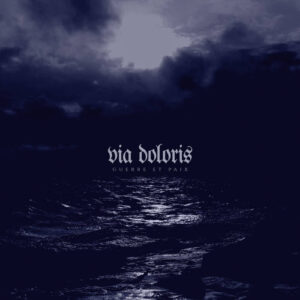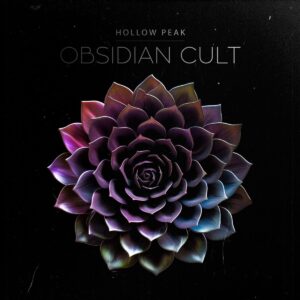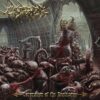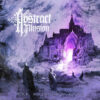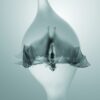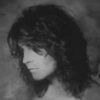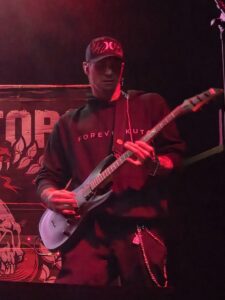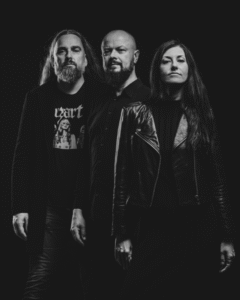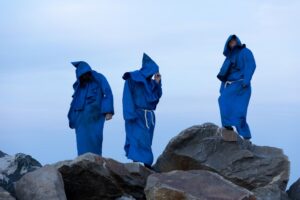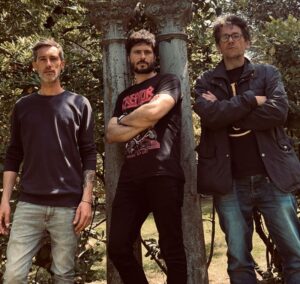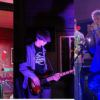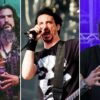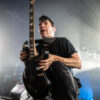MP
Fer De Lance
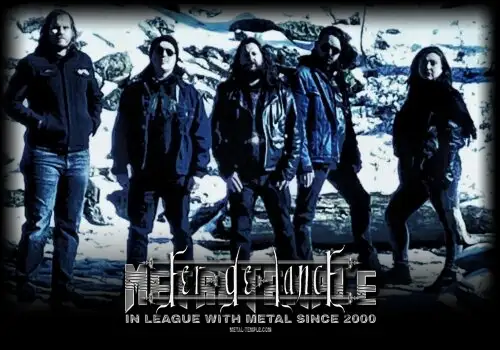
Music-wise, I am currently writing material for three upcoming Fer de Lance titles. Moreover, as it has been a while since I've performed for people, FDL is currently practicing our live show and getting our performance levels to where they need to be.
Thanks for the kind words. Concerning Professor Emeritus, I admittedly put very little of myself into that band, as I neither liked nor believed in the music, but I was there to help out Rusty. After Professor Emeritus, I began, once again, writing songs for Moros Nyx. I finished several demos, and maybe, one day, these songs will see the light of day as I felt they were much stronger than the "Revolution Street" material. However, during the writing sessions for Moros Nyx, heavier and darker music was creeping into my writing. I have always listened to extreme music, progressive music, and a lot of 70s and 80s rock music, and yet power metal, outside of some superb albums by Blind Guardian, Angra, Rhapsody, and Labyrinth, was never something I felt strongly about. Rusty heard these new songs and wanted to form a new band, Fer de Lance, where we could explore these songs. Some of those songs ended up on our "Colossus" EP, and some have yet to be released.
In terms of the band's image, I don't care about that at all. I write music for myself, and if the band likes it, or fans like it, that's great. Regarding ideas, I tend to focus on the darker and deeper aspects of humankind. I think music, especially metal music, should have a voice, and a lot of FDL's music concerns my life experience and thoughts on important issues. However, to Rusty's credit, as we could have made FDL's music with just the two of us, he wanted FDL to be something bigger beyond a project. In FDL, there are a lot of shared commonalities now amongst our members in exploring new music, new ideas, and making music that may not necessarily put us on any charts but is something we believe in.
I don't believe we have ever debated what would come next. What comes next is what we do. The first songs I wrote for "The Hyperborean" seemed to share common themes, and I decided to write the story of the Mariner from these songs. For the most part, I haven't shared the full story of what I intended, as I want listeners to come to their own conclusions. While standalone songs definitely have their place, one of the new albums I am working on might have more standalone songs. Yet, what I like about concept albums, about story-telling throughout an entire album, is that there is space to explore what I want to say.
Without going into too much detail, as this is more of a conversation to have with a few drinks, I was most troubled by how quickly we humans turned on each other over the past two years. This shouldn't be surprising because the world has not known a moment of peace in quite a long time. But our demand for commodities and immediate comforts has become so ingratiated, at least in North American cultures, that we expose ourselves to the manipulative powers of politics and greed in a feeding frenzy of our own flesh for minor luxuries. Ronnie James Dio once wrote, "If you listen to fools, the mob rules" and I think this almost always rings true. However, it doesn't recognize the role of chaos and confusion in making a fool worth listening to. The Mariner's story recognizes that we have been in a never-ending cycle of "listening to fools" for thousands of years. How the Mariner deals with it might be the simplest way–to avoid the voices of others. Is it the right way? I don't know.
Luckily, I prefer to spend a lot of time to myself. When you separate from others, it gives you a different perspective on the world. Moreover, I had the opportunity to take long hikes and spend a lot of time in nature. All that being said, I also had music. I had a guitar, and I had ideas. Everything could have gone to shit, but those two things kept me going. Writing "The Hyperborean" was much-needed work, and I am lucky that I was able and free to write when so many were suffering from the pandemic's isolation, death, and conflict.
I agree. Most are always looking for a better life, but this "better life" seems to be related to buying something or owning more: a materialistic better life. But some search for peace, search for perspective, search for relief. I search for something that maybe doesn't exist: serenity. I think this understanding, this empathy, for what the Mariner searches for is something that can connect an audience with the art.
I think escapism and the idea of a utopia are interesting. We keep in our minds the way the world should be and shouldn't be, and the place and time that forms in our minds, the place we wish to escape to, can tell us a lot about who we are. However, at the same time, by escaping instead of dealing with our problems, we float on currents towards ever more predictable results: giving into the very injustice we wish to avoid. Yet, fighting these currents takes a mental, physical, and emotional toll as well. So, is there a land of milk and honey? Is there Hyperborea? Is there hope? That is partially what I wanted to explore in "The Hyperborean." I found that maybe there is peace for the person, but the world as a whole seems to thrive in chaos.
I try not to think of a genre or to sound like something when I write music. I try to make creating music a natural process so that music and story are difficult to separate from each other. Of course, after everything is demoed, I can hear how the musical choices that I've made intertwine with the story. More than any other instrument, I'd say the acoustic guitars move the storyline and connect styles/music that would not normally work together.
I think what distinguishes FDL from other bands we are either often compared with or those in the scenes we play is our diversity of styles, our use of polyphony in melodies, harmonies, and choirs, and the acoustic guitar is integral to our sound. I think the most elevated sections of "The Hyperborean" are those moments when every musician, every part, is playing its own individual part; we are drifting further and further towards chaos, but in reality, it is everyone working towards exploring new areas of the song, and we all eventually return triumphantly to our main theme. This happens a few times over the album and gives the audience that experience exploring, along with the story of the Mariner. I think for the other band members, what hooked them all on the idea of the concept album was the song "The Hyperborean." Is it the atmosphere, is it creating something new? I have never really asked them.
It's difficult to say. I worked in the Mediterranean area for many years and came into contact with a lot of music that you may never hear if you don't live in those places. Also, as an acoustic player, I enjoy Spanish flamenco, Greek folk music, and the pizzica music of Southern Italy. So, a lot of the music I've heard influences a part of the Mariner's journey and his origins. The images of the Mariner's story also inspired me to go further into the Mediterranean in this album. To her credit, Mandy was great in the studio, inspiring the images that fuelled the album's creativity. 90% of the time, I improvise solos, electric and acoustic, and Mandy was crucial in working with me to explore the world of the Mariner through my guitar.
This might make me sound like an asshole, but the writing for FDL has been extremely easy. When I can find the time to write (this is the truly difficult part), the music springs forth quicker than I can sometimes record. Most of the song's riffs and melodies are written very quickly and sometimes improvised when I demo a song. I will write a drum part, then build the song by improvising over that drum part. The first EP, along with "The Hyperborean," "Ad Bestias," and "Arctic Winds," were all written in this way. But, some songs, like "The Mariner," "Sirens," and "Northern Skies" were written beforehand on an acoustic guitar, usually outside and by a campfire. Why try and force a song out when there is so much inspiration in the world? I just finished a new song for an upcoming release as I was sitting by the window, and the sound of wind and pounding rain filled a lot of the empty spaces in the song where I was getting stuck.
As most of the bands I have been a part of have been in or around Chicago, and I am always traveling, this has always been tricky. What seems to work moderately well is that I will demo an entire song, all instruments and voices, and then the band practices these songs, then records them in the studio, and then when I am in town, we practice. For "The Hyperborean," this changed a little with sometimes sending songs without drums but with a metronome for Scud to record drums, and also, usually, I left the bass out of demos for Rusty to write his own parts. Then as we can't have weekly practices, I meet digitally one-on-one with Mandy and J. Geist and we go over how to play the parts. To everyone's credit, to be in a band with me. During our first practice after recording "The Hyperborean" and our first ever with J. Geist, everyone practiced on their own time before we came together. I thought we were show-worthy after that first practice, and it has only improved. The band has some quality musicians.
Watching "Pink Floyd Live in Pompeii (1972)" or even the newer concert they recorded there in 2016 are formative experiences for me. Not only is Pink Floyd a major influence for me, but especially in that show, you can hear the influence of places with history on the band. All the pain, pleasure, laughter, and hate experienced in that place becomes one with Pink Floyd's masterful music and epic atmosphere. I think these historic places have the power to change both the perception of the listener as well as the energy of the band, so I would absolutely play at a place like Pompeii with the right epic energy. However, I would be careful with some places, as I think some historical places, while never to be forgotten, shouldn't be allowed to have their particular energy maintained and spread through music.
I think you hit the nail on the head. What I like about "Ad Bestias" is first its message, but then the song itself has so many diverse styles within it that it makes it a very interesting song to play, but also shows the
many faces of Fer de Lance in one song.
Thanks for the kind words. As I said before, I made the drum track for "The Hyperborean," and then I started coming up with melodies that I wanted to include in the song. I went through about ten different melodies before I came up with one that I could see repeating within the album but also remained infectious enough to clinch everyone's attention at the album's end. Once I found the melody, I started figuring out the best chords underneath it, and once I found those chords, I started building that song. I remember that when I reached the chorus sections, I improvised the guitar parts and knew I would have to use a very low growl in this song. Finally, the melodic, almost Thin Lizzy part in that song was taken from another song I was working on that I had written on a hike/camping trip. I am very happy with how the song came out, but I wouldn't say it is my "Stargazer, " but it is my favorite moment on the album, and it has all that I like in music: epicness, atmosphere, and constantly revolving moods and ideas. I do think I still have my "Stargazer" inside me.
Unfortunately, due to the Pandemic, KIT has been postponed again. We plan to play it in 2023 and are looking at scheduling shows around KIT (April/May). We have had several offers for festivals all over Europe, and we are now just trying to figure out what we can do. With the war in Europe and inflation in the USA, it isn't getting easier to travel. But we are very excited to return to Europe, and maybe some other parts of the world. However, until then, we are writing and have several shows in the works this Summer and Fall in the USA. There are some great metal scenes in the Midwest cities of the USA, and it seems a shame that we don't try and play all of them.
Thanks for the great questions, Lior. Cheers!

More results...

